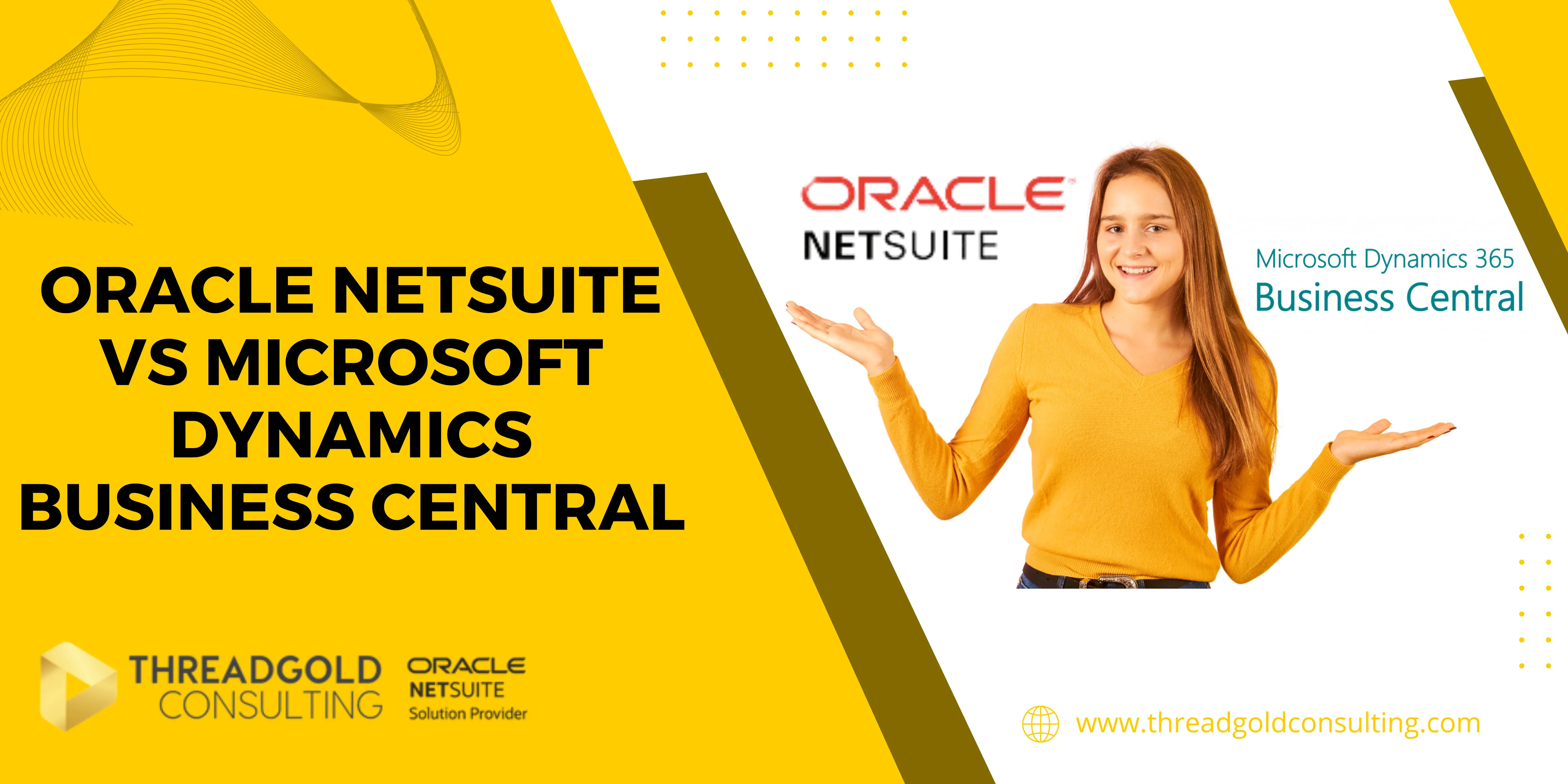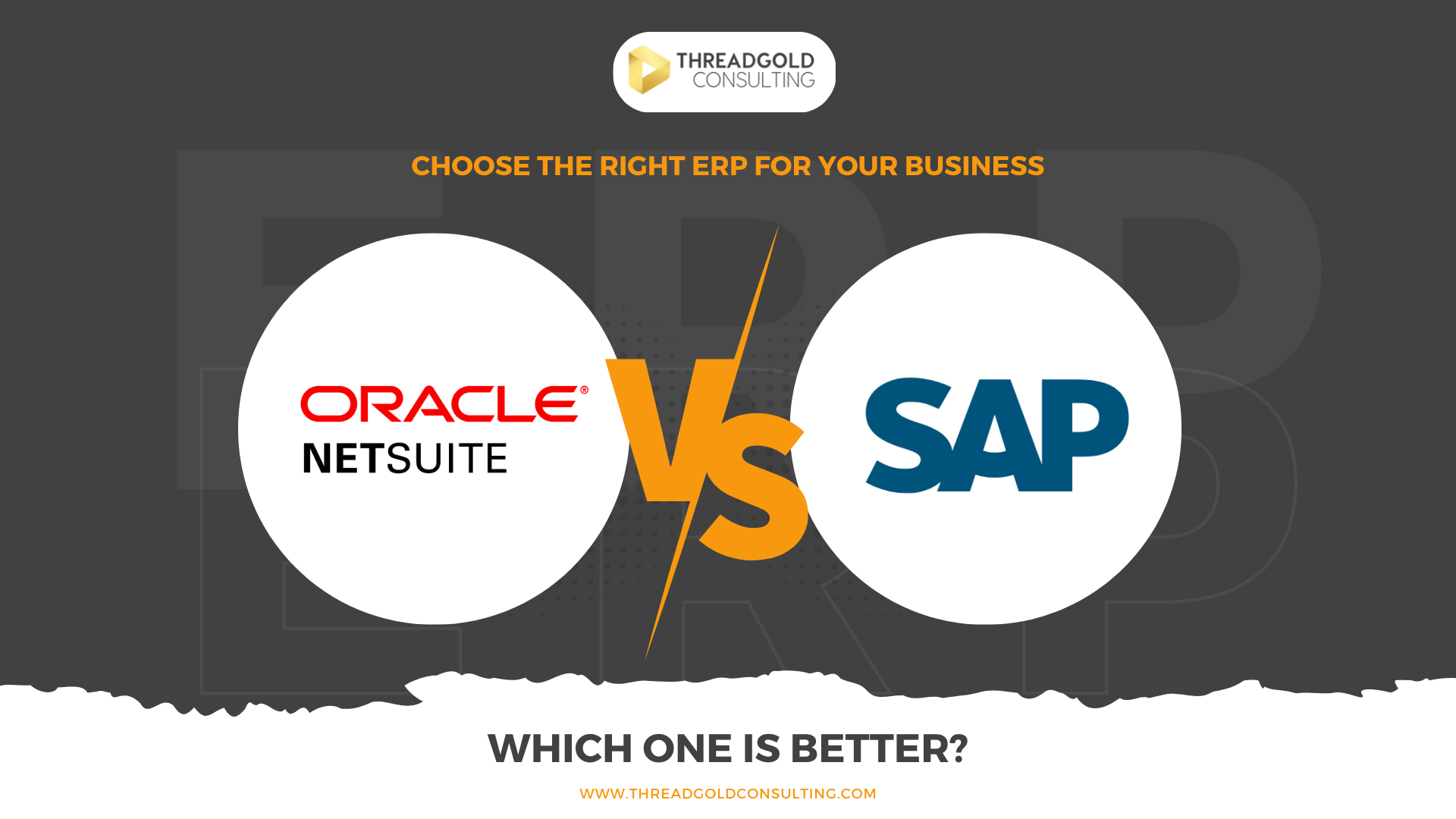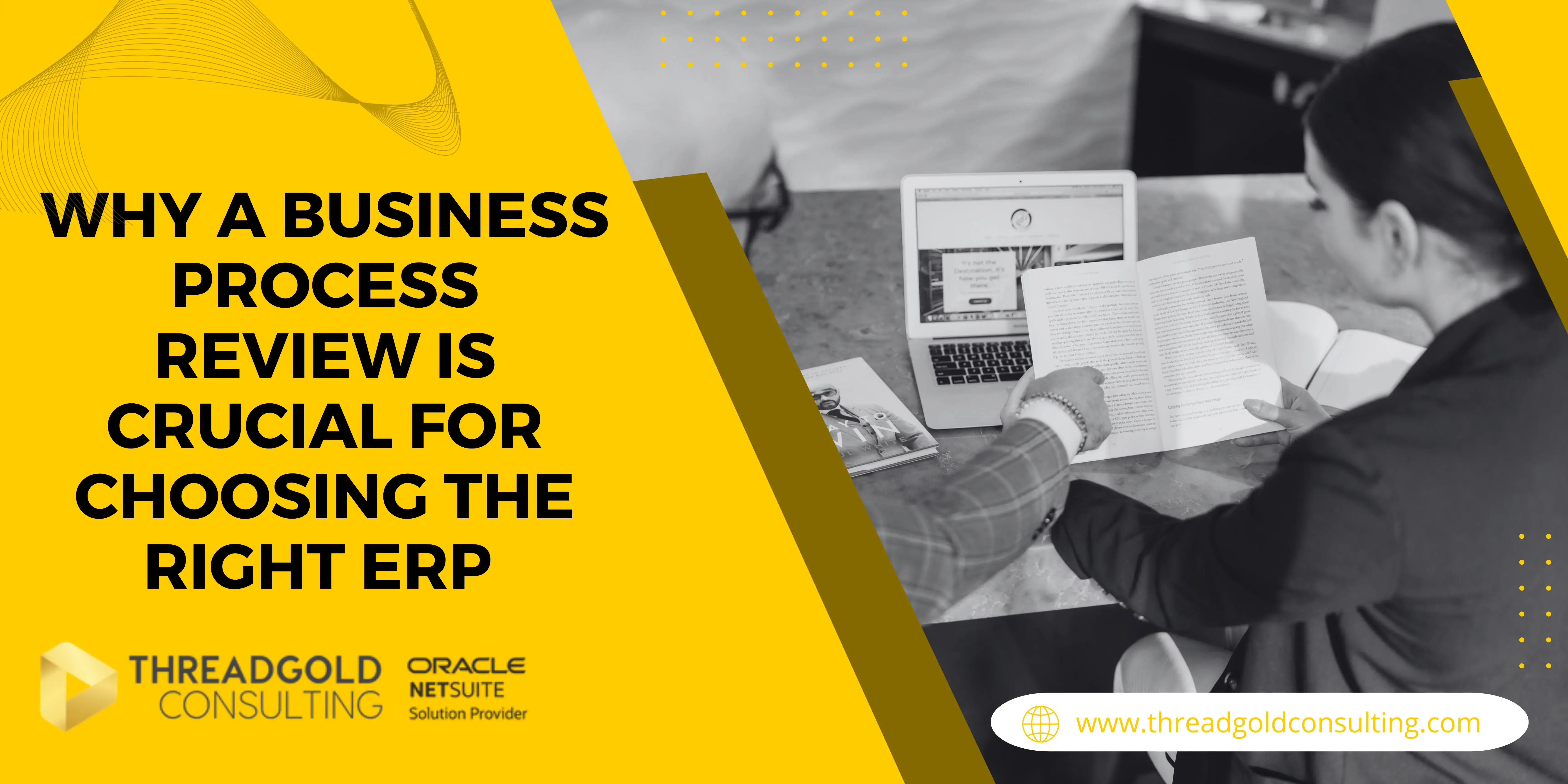If you’re in the market for a new ERP system, you know how important it is to choose the right software for your business. Enterprise Resource Planning (ERP) systems help organisations manage their key processes, such as finance, operations, sales, and customer relationship management, all from one platform. They centralise data and processes, making it easier to stay organised and efficient.
In this blog, we’ll compare two leading ERP systems: Oracle NetSuite and Microsoft Dynamics 365 Business Central. We’ll cover their features, pricing, deployment options, and other key factors like user experience, integration, and customer support. By the end, you’ll have a clearer idea of which ERP system suits your business best.
Oracle NetSuite Overview
Oracle NetSuite is a cloud-based ERP system designed to help businesses grow and adapt. It combines essential functions like finance, CRM, manufacturing and e-commerce on one platform. NetSuite’s single data model gives businesses a clear and consistent view of their operations, which is especially valuable for growing companies that need transparency across departments.
One of NetSuite’s strengths is its reporting tools. Through its advanced reporting module "SuiteAnalytics", it provides real-time visibility into operations with customisable dashboards and analytics. Businesses can monitor key metrics, track financial performance, and make informed decisions quickly. For example, if your business deals with fluctuating sales volumes or seasonal trends, NetSuite’s reporting capabilities make it much easier to plan ahead and avoid surprises.
NetSuite also offers industry-specific solutions for sectors like retail, manufacturing, and services. These solutions cater to the unique challenges of each industry, ensuring businesses get the features they need to succeed. Whether you run a retail business looking for inventory management or a professional services firm needing project tracking, NetSuite has tools designed to address those specific needs.
Microsoft Dynamics Business Central Overview
Microsoft Dynamics 365 Business Central works well for businesses that already use Microsoft tools. It integrates seamlessly with Office 365, Power BI, and other Microsoft applications, creating a connected workflow. For businesses that rely heavily on Excel, Outlook, or Teams, this level of integration can simplify processes and reduce the need for additional training.
Business Central offers advanced analytics through tools like Power BI. This makes it easy to turn data into insights, helping businesses make better decisions. For example, if you’re tracking sales trends, you can use Power BI to visualise the data and pinpoint areas for improvement. Its user-friendly design also means teams can quickly learn and use the system, boosting productivity. The consistent interface across Microsoft products makes it easy for teams to transition, especially if they’re familiar with other Microsoft tools.
Feature Comparison: NetSuite vs Business Central
Financial Management
NetSuite’s OneWorld module is ideal for businesses with complex financial needs, such as managing multiple entities or currencies. For instance, a company with offices in different countries can use NetSuite to consolidate financial data and comply with local regulations.
Business Central is better suited for small to medium-sized businesses operating within one legal entity. It doesn’t handle financial consolidation as easily as NetSuite, which could be a drawback for businesses planning to expand internationally.
Supply Chain Features
Both systems offer strong supply chain management features. NetSuite provides a global view, perfect for businesses with extensive supply chains. It allows users to track inventory levels, monitor shipments, and manage supplier relationships all in one place.
On the other hand, Business Central focuses on improving processes through Microsoft’s analytics tools. For example, it can help businesses identify bottlenecks in their supply chain and suggest ways to address them.
Human Resources
NetSuite includes HR features, such as employee records, organisational insights, and routine HR task management. These tools are especially useful for businesses with growing teams, as they make it easier to manage onboarding, payroll, and performance tracking.
Business Central lacks built-in HR functionality, so you’ll need third-party integrations if this is a priority. For some businesses, this might not be a dealbreaker, but it’s something to consider if HR management is a key requirement.
E-commerce
NetSuite supports scalable e-commerce solutions through its SuiteCommerce module, suitable for businesses of all sizes. Whether you’re running a small online store or managing multiple sales channels, NetSuite’s tools can help streamline operations.
Business Central does not include e-commerce capabilities, which could be a limitation for some organisations. If e-commerce is a significant part of your business, NetSuite might be the better choice.
Professional Services
Both systems offer project management tools, but NetSuite goes further. It includes timesheets, expense tracking, and resource management, making it better for service-based businesses.
For example, a consultancy firm can use NetSuite to track billable hours, manage client projects, and monitor expenses all in one system. Business Central’s project management tools are more basic, focusing mainly on task tracking and scheduling.
Customisation and Flexibility
NetSuite allows extensive customisation, enabling businesses to adapt the system to their specific needs. New modules and features can be added as the business grows, ensuring long-term usability. For example, a business that starts with basic financials can later add CRM or supply chain modules as needed.
Business Central also offers customisation options, but these are harder to configure and often focus on integration with Microsoft’s ecosystem. If your business doesn’t use other Microsoft tools, you may find Business Central less flexible. Additionally, customisations in Business Central can require more time and expertise, which might increase implementation costs.
Integration and Implementation
Integration
NetSuite integrates easily with third-party applications like Shopify, HubSpot, and Salesforce through its SuiteConnector tool. This makes it a great choice for businesses needing complex integrations. For example, an e-commerce business using Shopify can connect it with NetSuite to automatically update inventory levels and sales data.
Business Central excels at integrating with Microsoft’s products but struggles with external systems. If your business relies on non-Microsoft tools, you may face challenges. For instance, integrating Business Central with platforms like Salesforce or Zendesk might require additional customisation or middleware, adding complexity to the process.
Implementation
The implementation of NetSuite can be achieved in as little as 60 days, depending on the complexity of the business model. NetSuite's simple architecture makes it easy for developers to configure the system and get it up and running in no time. NetSuite implementations can cost anywhere from $10,000 to $250,000, depending on the size of the business and the integrations required.
Business Central is also known for it quick implementation, especially for businesses already utilising Microsoft products, facilitating a smoother transition and faster time to value. However, the system is not as easy to configure for businesses that require complex integrations, and this could add significant time to go-live.
When considering customisation, integration and implementation, it essentially comes down to how complex your requirements are. If you are a simple business that mostly requires financials and reporting, then Business Central would be ideal. However, if you require any complex integrations or customisations (outside of microsoft products), then NetSuite is a much better platform for you.
Pricing and Affordability
NetSuite uses a subscription-based model. Costs start at around $1000 per month for the basic financials package. Pricing depends on the number of users and modules required, with flexible terms allowing you to scale as needed. This flexibility is ideal for growing businesses, as you can start small and expand over time. Check out our in depth NetSuite pricing guide for more information.
Business Central is also subscription-based and starts at approximately £50 per user per month for the essentials package. While the software is cheaper than NetSuite, implementation costs can be three times higher, making the total investment comparable. For businesses with tight budgets, this is an important factor to consider.
Support, Updates, and Security
Support
NetSuite offers specialised support tailored to industry needs. This includes dedicated account managers and 24/7 technical support for critical issues. Business Central benefits from Microsoft’s global support network, ensuring help is always available. For businesses with teams in multiple locations, this can be a valuable resource. You can also utilise your implementation partner and set up a support package with them.
Updates
NetSuite provides bi-annual updates to keep the system current. These updates include new features, performance improvements, and security enhancements. As the system is cloud-based, you do not need to do anything in terms of upgrade maintenance. Business Central is also a cloud solution offering continuous updates. However, the frequency of updates in Business Central might require businesses to adapt more often.
Security
Both platforms prioritise security and compliance. NetSuite has global data centres armed by security 24/7, and encryption measures to protect your data. Business Central adheres to Microsoft’s strict security standards, making both options reliable for businesses handling sensitive information.
Final Thoughts
Choosing between NetSuite and Business Central depends on your business’s size, industry, and existing systems. NetSuite is ideal for businesses with complex needs, global operations, or a focus on scalability. Business Central works well for smaller businesses prioritising cost-effectiveness and seamless integration with Microsoft tools.
If you’re still unsure which ERP system is right for you, contact us today. We’d be happy to help you explore your options and find the perfect solution for your organisation. Whether you need a system that supports international operations or a budget-friendly option for local business processes, we can guide you in the right direction.
Want to try NetSuite for free? Check out our 14-day free trial. No commitment or card details needed, just a sneak peek into the power of NetSuite!




-1.webp)


